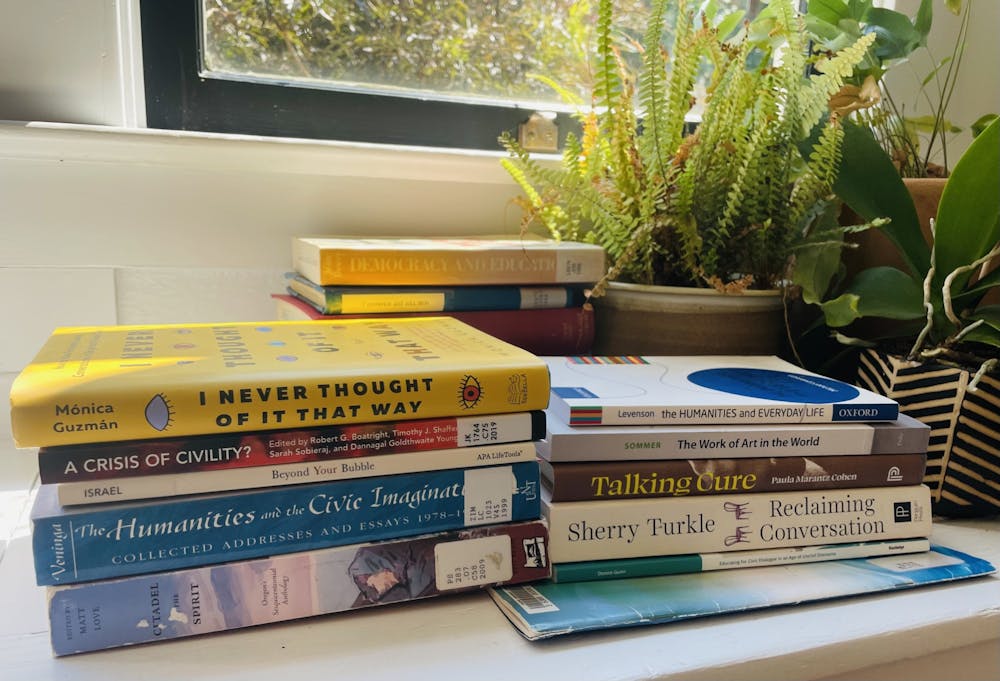The University of Portland has secured a historic $500,000 grant from the Mellon Foundation, a foundation dedicated to funding arts and humanities curricula. The grant will allow the university to expand humanities education beyond the classroom and deepen its ties with the local Portland community.
The grant, the largest humanities-focused award in the school's history, will fund a three-year “civic humanities incubator” aimed at fostering civic engagement through research, curriculum development and local nonprofit partnerships starting in the 2027-28 school year, according to English professors Jen McDaneld and Molly Hiro.
The campaign for receiving these funds was kickstarted by McDaneld and Hiro, who began seeking ways to sustain and expand the humanities curriculum amid a national decline in funding for the field.
Their journey to support the humanities began by securing a $150,000 National Endowment for the Humanities grant to fund on-campus education through their Public Research Fellows (PRF) program. Soon after, however, the pair began searching for funding to promote humanities off campus by engaging with the local Portland community.
The Mellon Foundation grant fits that bill.
To accomplish their goals, the funding from the Mellon grant has been structured to provide stipends for student internships with local organizations, support collaborative research between faculty and community partners and develop a curriculum that emphasizes the humanities’ role in addressing real-world challenges.
McDaneld and Hiro ultimately envision the incubator as part of a larger initiative, dubbed “the hub,” which will house PRF, undergraduate research projects and future civic education efforts.
Dean of the College of Arts and Sciences Valerie Banschbach emphasizes how civic engagement is especially relevant to the Portland community.
“You can really feel it as a resident of Portland — how much people want to work together to make a difference,” Banschbach said. “That's democracy in action. So it seems to me… that there's just a huge opportunity for civic work because it fits the spirit of the city.”
Senior Katherine Johnson, a PRF participant, credits PRF and its focus on humanities-based civic engagement with shaping her post-graduation aspirations in nonprofit and grant work.
“[I have been inspired by] getting to combine the public humanities work, which is connecting with other people, with digital humanities, which is using the technology to enrich your experience of the humanities,” Johnson said. “So [my future is] almost entirely inspired by my work with PRF.”
According to Banschbach, Hiro and McDaneld’s work exemplifies an entrepreneurial approach to humanities funding, securing external support to ensure the field’s longevity and relevance.
“It [the humanities] shouldn't be hidden, but it's hidden to folks nowadays, in our fast-moving society,” Banschbach said. “They're [Hiro and McDaneld] making that apparent, and they're immediately realizing that value in community-engaged projects…there is so much value in understanding, culture, history, philosophy, literature.”
While the incubator is still in its early stages, it signals a broader commitment to demonstrating the humanities’ impact beyond academia.
“It definitely brings the humanities out of the classroom and shows it off to more people,” McDaneld said. “You can see how what we do in a humanities classroom translates to the real world.”
Updates and information about PRF are available on the program’s website and Instagram.
Editor's note: A previous version of this story displayed a photo illustration of money as the header image.
Kaeden Souki is a reporter at The Beacon. He can be reached at souki28@up.edu.








